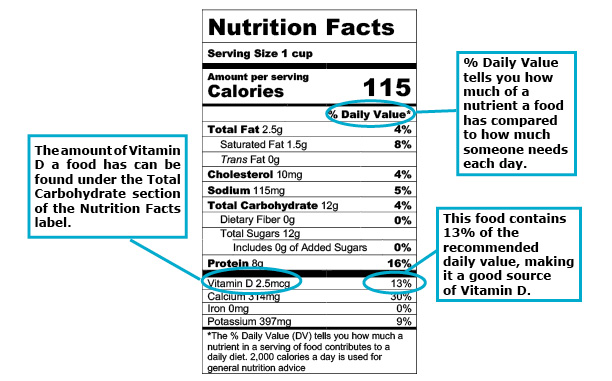
What is Vitamin D?
Have you ever read a Nutrition Facts Label and wondered why vitamin D is one of the nutrients listed? Vitamin D is a nutrient of concern, meaning most Americans don’t consume enough. Low intake of Vitamin D can be associated with health concerns, such as osteoporosis.
Where can you find Vitamin D on the Nutrition Facts label?
You can find Vitamin D on the lower portion of the label, where the vitamins and minerals are shown. Recently, the FDA has made a change to the list of nutrients that are required to be on the Nutrient Fact label, and it is now mandatory for Vitamin D to be listed because it is a nutrient of concern. The Nutrition Facts label tells you the amount of Vitamin D in micrograms that the food contains, as well as the % Daily Value of the food to give you an idea of whether the food is low or high in Vitamin D.

What does Vitamin D do for our bodies?
Vitamin D is important to maintain strong, healthy bones, allow your muscles to function properly, and help your immune system fight off any infections. It is also important for getting enough calcium. Without sufficient Vitamin D, we cannot adequately absorb calcium from the gut, which can negatively impact bone health.
What can we do get enough vitamin D?
The recommended daily amount of Vitamin D is 15 micrograms for kids and adults. There are three main ways to get vitamin D: foods and beverages, sunlight, and supplements.
Most of the Vitamin D we consume comes from foods and beverages that are fortified, many of which are dairy products. Fortification is a way to add vitamins and minerals to foods to help people get nutrients they need. Some examples of fortified Vitamin D foods include milk, cheese, yogurt, soy milk, orange juice, and breakfast cereals. However, Vitamin D can also be found naturally in some fish such as salmon, mackerel, and sardines.
Another way we can get Vitamin D is through sunlight. Our bodies are able to make vitamin D when sun hits exposed skin. Remember to be careful to avoid extended exposure to the sun without proper sunscreen and protection!
Some individuals may need extra Vitamin D to meet their needs, but remember to always check with your health care provider before adding supplements to your diet.
For more information, check out the Vitamin D Fact Sheet from the National Institute of Health.
